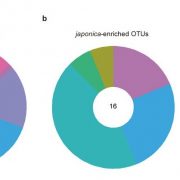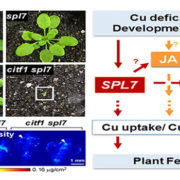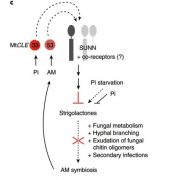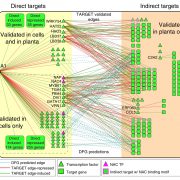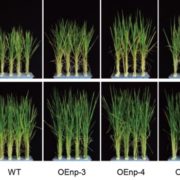The white lupin trehalase gene regulates cluster root formation and function under phosphorus deficiency
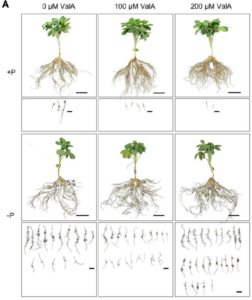 Phosphorus (P) is an essential nutrient for plant growth and development. Under P deficiency, white lupin develops cluster roots (CR), specialized root structures that enhance soil exploration and nutrient acquisition. While sugar signaling, particularly sucrose, has been shown to play a role in the establishment of CR, other CR-associated features such as the root exudation of citrate and malate are independent of sucrose. Therefore, a key sugar signaling component specific to CR function remains to be identified. Using a combination of pharmacological and genetic studies, Xia and colleagues demonstrated that trehalose plays a critical role in both CR establishment and organic acid metabolism. Specific inhibition of trehalase, the only enzyme that catalyzes trehalose catabolism, by validamycin A, promotes trehalose accumulation and CR formation under P deficiency conditions. Similarly, silencing the TREHALASE1 gene also promotes CR formation, while overexpressing the gene leads to an opposite effect. This study sheds light on the close association between trehalose metabolism and P starvation response in plants. (Summary by Ching Chan @ntnuchanlab) Plant Physiology 10.1093/plphys/kiae290
Phosphorus (P) is an essential nutrient for plant growth and development. Under P deficiency, white lupin develops cluster roots (CR), specialized root structures that enhance soil exploration and nutrient acquisition. While sugar signaling, particularly sucrose, has been shown to play a role in the establishment of CR, other CR-associated features such as the root exudation of citrate and malate are independent of sucrose. Therefore, a key sugar signaling component specific to CR function remains to be identified. Using a combination of pharmacological and genetic studies, Xia and colleagues demonstrated that trehalose plays a critical role in both CR establishment and organic acid metabolism. Specific inhibition of trehalase, the only enzyme that catalyzes trehalose catabolism, by validamycin A, promotes trehalose accumulation and CR formation under P deficiency conditions. Similarly, silencing the TREHALASE1 gene also promotes CR formation, while overexpressing the gene leads to an opposite effect. This study sheds light on the close association between trehalose metabolism and P starvation response in plants. (Summary by Ching Chan @ntnuchanlab) Plant Physiology 10.1093/plphys/kiae290


